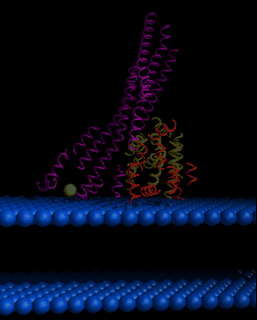
 |
|
 JPEG
version (42KB), TIFF version
(457KB)
JPEG
version (42KB), TIFF version
(457KB)
This image shows a model of Colicin Ia as it may associate with a bilayer membrane prior to insertion into the bilayer. The blue surface represents the phospholipid head groups at the surface of the inner bacterial membrane. The green sphere indicates a site know to be closely associated to the membrane via experimentation. The 10 alpha-helix sub-domain of the Insertion Domain is shown in yellow and the 8 alpha-helix sub-domain of the Insertion Domain in orange. The Attachment Domain as well as the Bridging Domain are shown in red.
In order to create a membrane, a program was written that generated a Protein Data Bank format file, containing atoms in locations that would reflect the location of phospholipids in the membrane. This file is included in this directory, and is called bilayer.pdb.
This file, bilayer.pdb, was opened twice in MidasPlus, and one of the layers was moved 40 angstroms away from the first layer with the "move" command.
command: open 0 bilayer.pdb command: open 1 bilayer.pdb command: move z 40 1Within MidasPlus, the radius of the atom type ``O'' (oxygen), of which the bilayer happened to be constructed, was made to be the radius of a phospholipid head. If working with oxygen atoms in the rest of a session, the ``O'' could have been any atom type, for example, we could have called the bilayer atoms ``R''.
To change the radius of the atoms, the MidasPlus command ``vdwopt define'' is used:
command: vdwopt define O 4.5Finally, neon was used to render the image. Using a neon.dat file, the tube type was set to 1, or smooth, and the atom size was set to 1.0.
The following is what the neon.dat file could look like. A neon.dat file is included in the directory /usr/local/midas/demos/sample_files.
1 |Tubetype |0=all atoms, 1=smooth, 2=bent, 3=straight| 3 |Sphere density |1=rough, 5=high resolution | 1 |Dash flag |0=no dashes, 1=draw dashes | 1 |Object flag |0=no objects, 1=draw objects | 0 |CPK flag |0=normal Render output, 1=CPK output | 0.18 |Stick thickness |Angstroms | 0.50 |Tube thickness |Angstroms | 0.15 |Dash thickness |Angstroms | 0.20 |Object thickness |Angstroms | 0.04 |Density thickness |Angstroms | 0 |Atom rendering |0=stick, 1=ball & stick | 1.00 |Atom size |Fraction of vdw radius (ball& stick mode)| 1 0.50 |Depthcue,Percent |0=n, 1=y; percent aft intensity | 0 0.0 0.0 |B-factor,Range |0=n, 1=shade to color, 2=rainbow; min-max| 1.0 1.0 1.0 |B-factor color |RGB (red, green, blue) | 4 |Number of dashes |Number drawn between each pair of atoms | 1.0 1.0 1.0 |Dash color |RGB (red, green, blue) | 0.30 |Dash offset |Dist. from atom to first dash, Angstroms | 0.00 |Dash/space ratio |0.0=dots, 0.4=dashes, 1.0=solid line | 4.00 |CA conect distance |Angstroms |
Partho Ghosh, Stephanie Mel, Robert Stroud Julie Newdoll. ©2004 The Regents, University of California; all rights reserved.